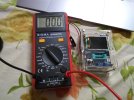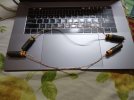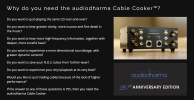superczar
Well-Known Member
- Joined
- Feb 5, 2008
- Messages
- 836
- Points
- 93
So if I am reading this correctlynoise has direct relation to jitter.
A - Electrical Noise resulting due to the uninformed usage of a cheap nvme drive makes its way into a fancy DAC - which in turn destabilizes its system and causes say a 50hz waveform to turn into a 49 or 51 hz which in turn results into say a noticeable deterioration of the original rhythm
i.e. distorts a waveform noticeably on the time domain for a signal in the range of 20-20x (10^-3)
vs
B - Meanwhile the mass market chipsets on your phone apply 10^-10 second scale adjustments for time dilation due to relativity on the signal received from GPS satellites (time domain precision )
while plugged into a 300 Rs charger plugged to your car's alternator (and all the electrical noise coming from it)
No wonder why my location shows as Senapati Bapat road when I am in Aundh
(or at the scale of precision required for audio signal precision, showing me in Oklahoma when I am in Delhi)
PS- I don't mean to offend, Just jousting so think of it as just a bit of a tongue-in-cheek reply





